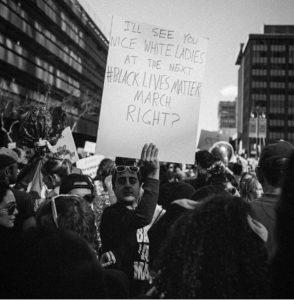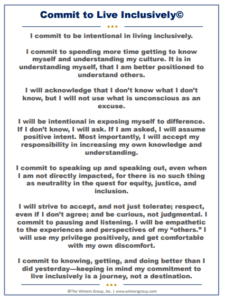
[dropshadowbox align=”center” effect=”lifted-both” width=”540px” height=”” background_color=”#3107b8″ border_width=”1″ border_color=”#dddddd” ]“I commit to speaking up and speaking out, even when I am not directly impacted, for there is no such as neutrality in the quest for equity, justice, and inclusion.”[/dropshadowbox]
This excerpt of our Pledge to Live Inclusively is perhaps one of the most timely and relevant. Just last weekend, millions of people from across the globe spoke up and out for women’s and human rights, and in protest of the election of President Donald Trump as part of the Women’s March. Some media outlets reported the march reached historic numbers, and even garnered the attention of allies and activists in different countries.
Some of the images and signs from the march were compelling. While some captured the unity and solidarity that existed among those who participated in the march, others were a little more critical, and carefully challenged the intentions and awareness of those who participated. The picture below is one of the latter:

The sign presents a valid question that is indicative of a much broader imperative—speaking up and speaking out even when we’re not directly impacted. It is much easier for us to speak up for causes that directly impact us—perhaps that is why so many women showed up on the national mall to protest last week. Issues around healthcare, reproductive rights, equal pay resonate with women, specifically white women. But what about racial injustice and police brutality? Is it not the responsibility of those women to also be actively engaged in dismantling systems that oppress people of color, the same way they speak out against those that oppress [white] woman? Is there really such thing as taking a stance on some issues of injustice, but remaining neutral on others? Is that really living inclusively?
Being intentional in living inclusively means being intentional in exposing and educating oneself to issues and inequities that impact communities (including those of which you may not belong). It means being an ally, and leveraging the power in your privilege and influence within your circles. It means choosing a side, even if it may be uncomfortable or the path less chosen. It means speaking up and out even when it is unpopular or feels like the issue may have nothing to do with you.
“If you are neutral in situations of injustice, you have chosen the side of the oppressor. If an elephant has its foot on the tail of a mouse and you say that you are neutral, the mouse will not appreciate your neutrality.” -Desmond TuTu


















